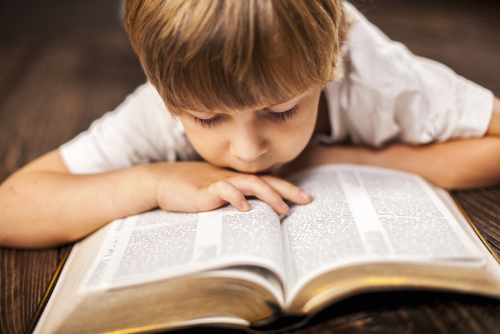The Directory for Masses with Children (DMC) is a church document issued in 1973, considered to be a supplement to the General Instruction of the Roman Missal. Its focus is on children in the church “who have not yet entered the period of pre-adolescence” (DMC #5).
“The Church must show special concern for baptized children who have yet to be fully initiated…as well as for children who have recently been admitted to holy communion.”
“A fully Christian life is inconceivable without participation in the liturgical services…The Church baptizes children and therefore…it must be concerned that once baptized they grow in communion with Christ and with each other. The sign and pledge of that communion is participation in the Eucharistic table.”
The DMC approaches its subject according to two different circumstances:
- Masses with adults in which children also participate (Sunday Mass and holy days)
- Masses with children in which only a few adults participate (parish school or catechetical program weekday Masses)
In the first category, Masses with adults in which children also participate, the following points are made:
- “The Christian spirit of the family is greatly fostered when children take part in these Masses together with their parents and other family members.”
- “It is necessary to take great care that the children present (at Sunday Mass) do not feel neglected because of their inability to participate or to understand what happens and what is proclaimed in the celebration. Some account should be taken of their presence: for example, by speaking to them directly in the introductory comments and at some point in the homily.”
- “If the number of children is large (at Sunday Mass) it may at times be suitable to plan the Mass so that it corresponds more closely to the needs of the children. In this case the homily should be directed to them but in such a way that adults may also benefit from it.”
- “Sometimes...if the place itself and the nature of the community permit, it will be appropriate to celebrate the liturgy of the word, including a homily, with children in a separate, but not too distant, room. Then, before the Eucharistic liturgy begins, the children are led to the place where the adults have meanwhile celebrated their own liturgy of the word.”
This last point is the directive from which we have developed the parish process known as Children’s Liturgy of the Word at Sunday Mass. It is considered to be a permissible adaptation within the Sunday liturgy. Any other adaptations employed must be by permission of the local bishop.
In the second category, Masses with children in which only a few adults participate, “the principles of active and conscious participation are…even more significant for Masses celebrated with children. Every effort should…be made to increase this participation and to make it more intense. For this reason, as many children as possible should have special parts in the celebration…preparing the place and the altar, acting as cantor, singing in a choir, playing musical instruments, proclaiming the readings, responding during the homily, reciting the intentions of the general intercessions, bringing the gifts to the altar.”
Other notable directives from the second category of this document include:
- “Religious silence has its importance even in Masses with children.”
- “Each Eucharistic celebration with children should be carefully prepared beforehand…in discussion with the adults and with the children who will have a special ministry in these Masses.”
- “Singing must be given great importance in all celebrations, but it is to be especially encouraged in every way for Masses celebrated with children.”
- “In view of the nature of the liturgy as an activity of the entire person and in view of the psychology of children, participation by means of gestures and posture should be strongly encouraged in masses with children.”
- “The liturgy should never appear as something dry and merely intellectual.”
- “Some rites and texts should never be adapted for children lest the difference between Masses with children and the Masses with adults become too pronounced.”
Careful consideration should be given to any children present at Sunday liturgy, but the adaptations suggested for a Mass at which the assembly is predominantly children should not be used at a Sunday Mass at which the assembly is predominantly adults.
Remember: parish liturgy preparation that maintains the integrity of our ritual prayer tradition requires regular on-going catechesis on the Mass as a necessary element of faith formation for both adults and children alike.
“The liturgy itself exerts its own inherent power to instruct. Yet within religious-education programs...importance should be given to catechesis on the Mass.”
Start your day with Always Forward, our award-winning e-newsletter. Get this smart, handpicked selection of the day’s top news, analysis, and opinion, delivered to your inbox. Sign up absolutely free today!

